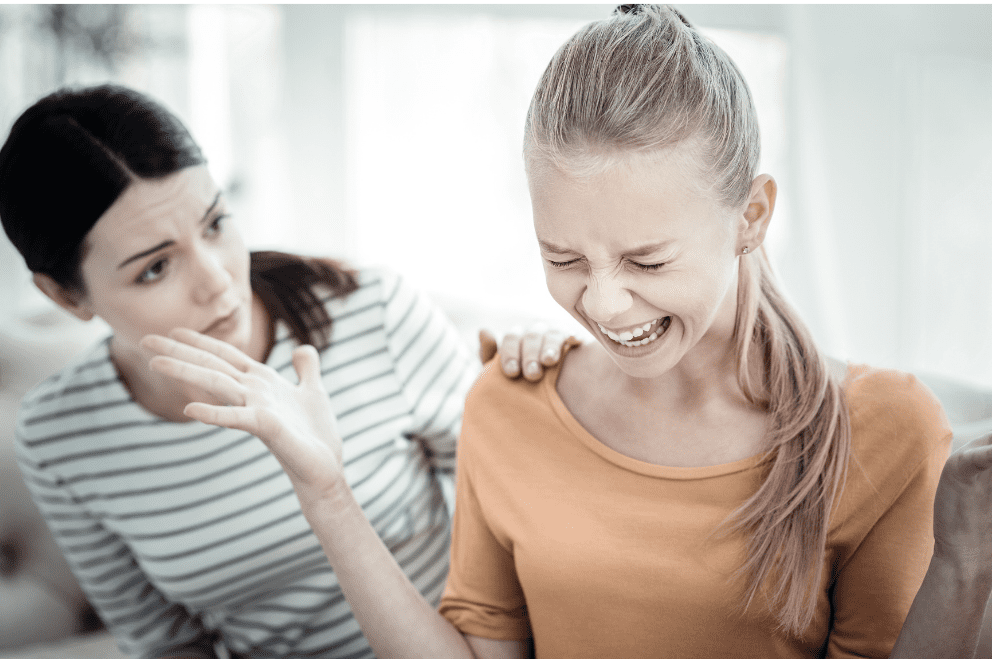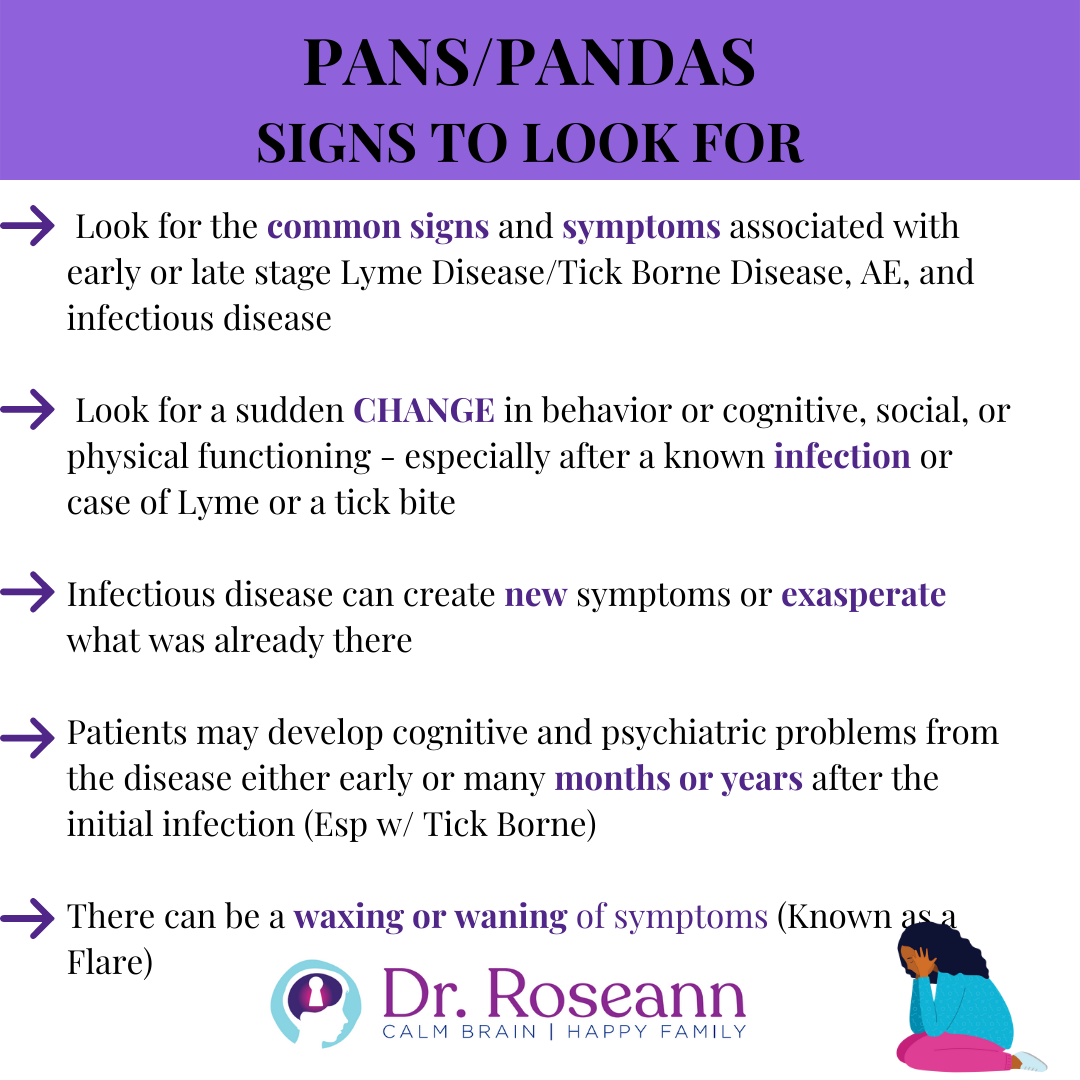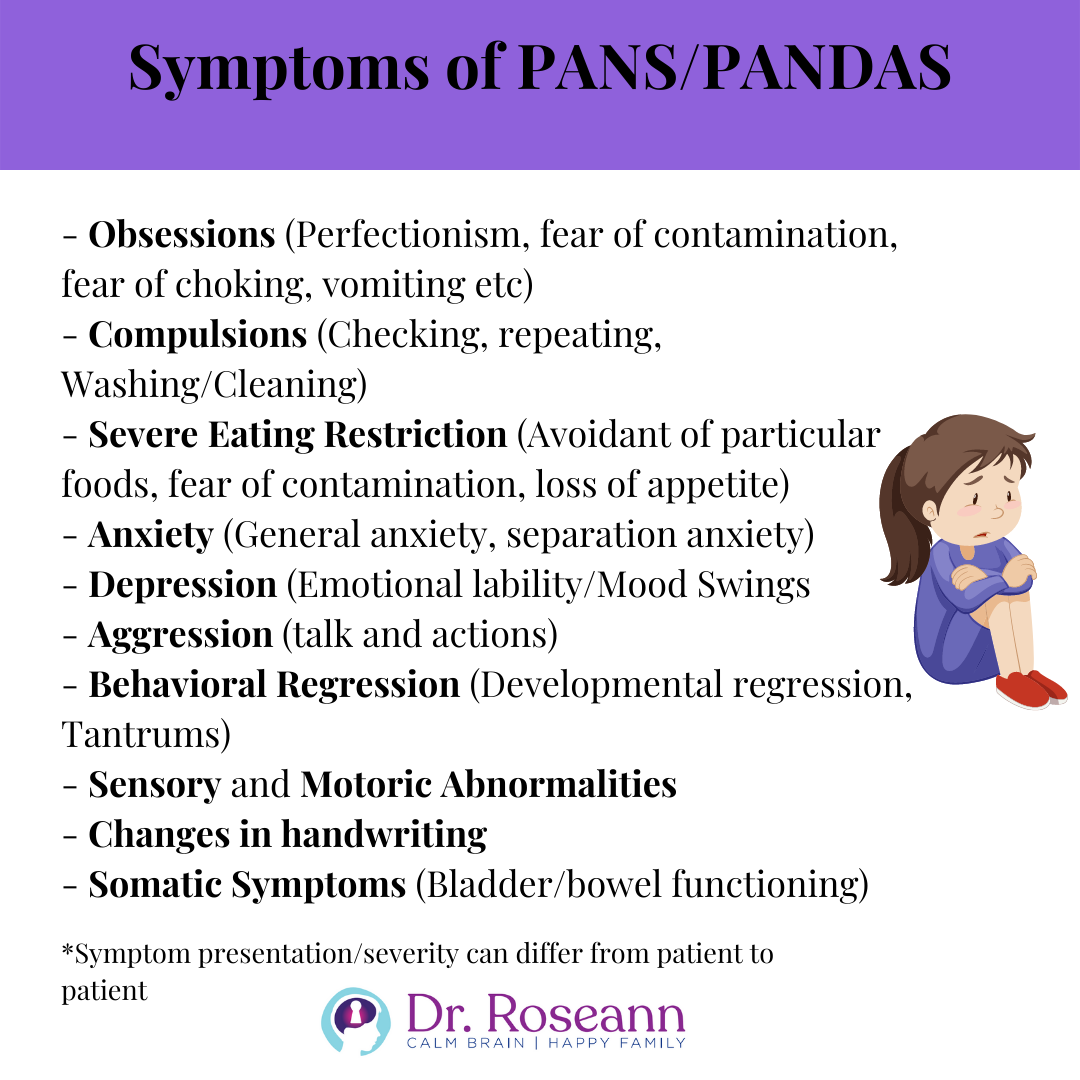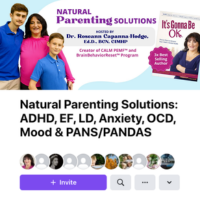You may have heard about PANS/PANDAS and might be wondering what exactly PANS/PANDAS is. You may speculate: “What are the signs and symptoms, and what do I do about it?” PANS and PANDAS are two distinct disorders that result from different infectious sources; however both produce similar neuropsychiatric and neurocognitive issues. Both of these have a similar way of presenting themselves, which is why we talk about both of them together.
What is PANS?
PANS stands for Pediatric Acute-onset Neuropsychiatric Syndrome. This is when an infectious trigger creates a misdirected immune response. Examples of common infectious sources of PANS can include Lyme, Pneumonia, Sinus Infections, Allergies, and Environmental triggers (ex: Mold). This response then results in inflammation in a child’s brain, which can produce debilitating symptoms.
 What is Criteria for a PANS Diagnosis:
What is Criteria for a PANS Diagnosis:
In children, PANS presents itself as an abrupt, dramatic onset of obsessive-compulsive disorder or severely restricted food intake.
According to Swedo (2012), this must be accompanied by the concurrent presence of additional neuropsychiatric symptoms with similarly severe and acute onset, from at least TWO of the following seven categories:
- Anxiety, Separation Anxiety
- Emotional Lability and/or Depression
- Irritability, aggression and/or severely oppositional behaviors
- Behavioral (developmental) Regression
- Deterioration in School Performance
- Sensory or Motor Abnormalities
- Somatic signs and symptoms, including:
- Sleep disturbances, enuresis or urinary frequency
What is PANDAS?
PANDAS stands for Pediatric Autoimmune Neuropsychiatric Disorders Associated with Streptococcal Infections. PANDAS patients test positive for a known trigger, such as strep throat, which brings on acute psychiatric symptoms.
What is Criteria for a PANDAS Diagnosis:
For a diagnosis of PANDAS, all five of the following criteria must be met:
- Presence of obsessive-compulsive disorder (OCD) or a tic disorder
- Prepubertal symptom onset (now can be adult onset)
- Acute symptom onset and episodic (relapsing-remitting) course
- Temporal association between Group A streptococcal infection and symptom onset/exacerbations
- Association with neurological abnormalities
With both PANS and PANDAS, there is a dramatic and sudden onset of a mental health issue, such as rage, OCD, anxiety, and even a loss of skills such as bladder functioning or regressive behaviors. PANS/PANDAS occur because of a misdirected immune response, where the body starts attacking itself. Although we are not exactly sure why this happens, common threads include kids who have a history of multiple infections, as well as genetic mutations such as MTHFR. The most common thread for PANS/PANDAS is the sudden and dramatic onset, because a sudden onset of a mental health problem is not normal.
What Do I Do If I Suspect My Child Has PANS/PANDAS?
I am here to tell you that there is help; even though PANS/PANDAS are very complex disorders and often very challenging in terms of getting the best help possible. The first thing you want to do if you suspect your child might have PANS/PANDAS is to go to a national organization such as ASPIRE Care or pandasnetwork.org and find a provider who has lots of experience.
You really want a provider who knows what they are doing because the longer it goes on and is left untreated, then the harder it is to eventually treat it. Here at our center, we work remotely with people with PANS/PANDAS all the time; where we do a lot of brain-based treatment and parental support. I have been fortunate to help hundreds of families over the years, and now I am working hard to train providers about PANS and PANDAS and how to identify the signs early, as early treatment is best for our kids. Because PANS and PANDAS arise from infections from multiple sources and environmental agents, there is not one singular treatment that applies for everybody. Therapies that help to regulate the brain and body like neurofeedback, biofeedback, somatic therapy, and EFT Tapping are used to regulate the nervous system and have been used to successfully treat children with PANS/PANDAS.
Check out my blog on Holistic Health Remedies for PANS/PANDAS to learn more about how to treat PANS/PANDAS
To learn more about PANS/PANDAS, read my blog on how PANS/PANDAS cases are on the rise and watch my YouTube Video on What is PANS/PANDAS?
Always remember… “Calm Brain, Happy Family™”
Are you looking for SOLUTIONS for your struggling child or teen?
Dr. Roseann and her team are all about solutions, so you are in the right place!
There are 3 ways to work with Dr. Roseann:
You can get her books for parents and professionals, including: It’s Gonna Be OK™: Proven Ways to Improve Your Child’s Mental Health, Teletherapy Toolkit™ and Brain Under Attack: A Resource For Parents and Caregivers of Children With PANS, PANDAS, and Autoimmune Encephalopathy.
If you are a business or organization that needs proactive guidance to support employee mental health or an organization looking for a brand representative, check out Dr. Roseann’s media page and professional speaking page to see how we can work together.
Dr. Roseann is a Children’s Mental Health Expert and Therapist who has been featured in/on hundreds of media outlets including, CBS, NBC, FOX News, PIX11 NYC, The New York Times, The Washington Post,, Business Insider, USA Today, CNET, Marth Stewart, and PARENTS. FORBES called her, “A thought leader in children’s mental health.”

She is the founder and director of The Global Institute of Children’s Mental Health and Dr. Roseann Capanna-Hodge. Dr. Roseann is a Board Certified Neurofeedback (BCN) Practitioner, a Board Member of the Northeast Region Biofeedback Society (NRBS), Certified Integrative Medicine Mental Health Provider (CMHIMP) and an Amen Clinic Certified Brain Health Coach. She is also a member of The International Lyme Disease and Associated Disease Society (ILADS), The American Psychological Association (APA), Anxiety and Depression Association of America (ADAA) National Association of School Psychologists (NASP), International OCD Foundation (IOCDF) International Society for Neurofeedback and Research (ISNR) and The Association of Applied Psychophysiology and Biofeedback (AAPB).
© Roseann-Capanna-Hodge, LLC 2023
Disclaimer: This article is not intended to give health advice and it is recommended to consult with a physician before beginning any new wellness regime. *The effectiveness of diagnosis and treatment vary by patient and condition. Dr. Roseann Capanna-Hodge, LLC does not guarantee certain results.



 What is Criteria for a PANS Diagnosis:
What is Criteria for a PANS Diagnosis: 










